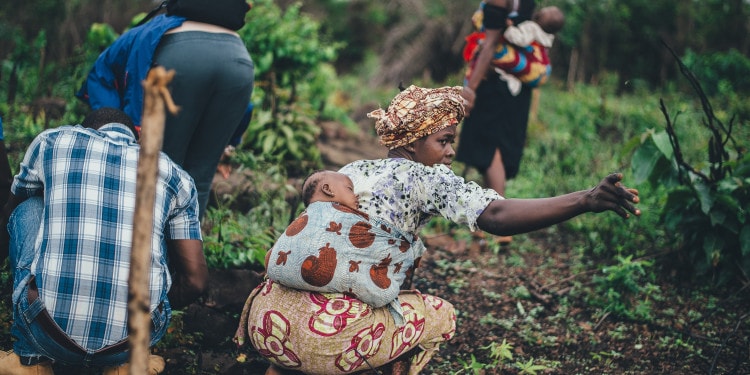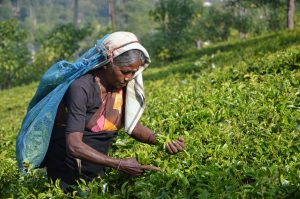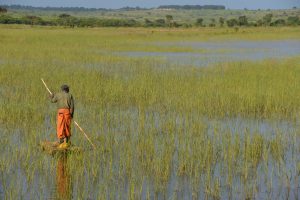After more than a decade of decreasing food insecurity numbers across the world, for the first time since 2003, the 2017 State of Food Security and Nutrition in the World report (SOFI) shows that global hunger is increasing and an estimated 815 million people worldwide are undernourished.
It is against this backdrop that the European Union (EU) institutions have stepped up its support to FAO with additional funding to fight hunger and promote sustainable livelihoods and agricultural practices.
In 2017, EU has provided a close to record high level of contributions with an estimated total value of USD 240 million. The last peak in EU funding to FAO was in 2009 in response to the high food price crises.
2017 saw the startup of several innovative EU-FAO initiatives and programmes which will address the global nature of the challenges faced by the world.

IN THE PHOTO: Wheat harvest. PHOTO CREDIT: CloudVisual on Unsplash
Food security and nutrition
In line with UN reform thinking and in order to better take advantage of each UN agency’s comparative advantage FAO has embarked on a number of EU funded joint programmes, one of the most significant is the USD 44 million nutrition initiative jointly undertaken with UNICEF in Malawi. The country has been suffering for decades of under-nutrition which is leading to an estimated loss in productivity and economic growth estimated at 10.3 percent annually.
In order to turn the tide, the National Nutritional Committee in Malawi has adopted a holistic approach to food security encompassing agriculture, primary health care, behavioural changes and governance mechanisms. The EU-FAO-UNICEF programme combines these elements in order to leave a lasting impact on the nutrition situation.
The root causes of poverty and migration
Over the past years, the tragedies of the boat migrants in the Mediterranean has pushed the EU to increase its focus on the root causes of poverty and migration. As a result, the EU released a trust fund specifically aimed at these issues, the EU Emergency Trust Fund for Africa.
In June 2017, FAO signed a USD 29 million contribution agreement with the European Union’s Emergency Trust Fund for Africa in South Sudan. This initiative will strengthen the livelihood resilience of pastoral communities in South Sudan’s border areas neighbouring with Ethiopia, Kenya, Sudan and Uganda. The project supports the implementation of South Sudan’s peace process through investments for peaceful coexistence among communities and equitable access to natural resources and economic opportunities. This aims to alleviate human suffering arising from forced displacement and irregular migration.
IN THE PHOTO: Tea harvest in Sri Lanka. PHOTO CREDIT: Asantha Abeysooriya on Unsplash
Sustainable Wildlife Management
2017 marked the startup of the EU funded USD 50 million initiative to halt unsustainable wildlife hunting in African, Caribbean and Pacific states. The project will promote sustainable use of wildlife resources by strengthening the capacity of rural communities to increase the supply of sustainably produced meat and farmed fish. This will help to avert a looming protein deficit for poor rural families and meet the growing rural and urban demand for food.
Aligning priorities to the Sustainable Development Goals
In June 2017, the EU and its member states signed the strategic blueprint, outlining the future of European development policy, the new European Consensus on Development.
The consensus is important given the crucial role of the EU in the area of development cooperation. The EU remains the world’s largest development aid donor, providing more than half of the assistance worldwide. The overarching goal is the eradication of poverty, by promoting good governance, human and economic development and tackling universal issues such as fighting hunger and preserving the world’s natural resources. The European consensus for development is the EU’s response to the UN 2030 agenda for sustainable development.
Revitalized partnership
The new European Consensus on Development identifies five drivers to implement the SDGs: Gender, Youth, Mobility, Energy, and Investment.
It is in this context that the revitalising of the EU-FAO Strategic Dialogue Meeting became a key topic for FAO. The meeting, held in September, was more inclusive than ever, counting counterparts from across the EU institutions and services. Through this new format a number of joint priorities for action over the coming year’s emerged:
- Food crises and resilience and food systems: enhance efforts to improve joint analysis and information by delivering the Global Report on Food Crises and by establishing a far-reaching Global Network to improve coordination in building resilience and contribute to addressing the humanitarian-development nexus;
- Climate change and natural resource management: enable partner countries to refine their National Determined Contributions (NDCs) to reflect both the Paris Agreement and the Marrakesh Action Proclamation;
- Agricultural investment: develop collaborative institutional arrangements and partnerships in support of the European External Investment Plan (EIP);
- Nutrition: meet global commitments in the area of nutrition, both sides agreed to scale up their collaboration to enable food systems to deliver healthy diets.
IN THE PHOTO: Angola. PHOTO CREDIT: Yolande Conradie on Unsplash
Moving forward
Over the coming years, the challenge for the EU-FAO cooperation will be to keep the current momentum going and ensure that global challenges are met with global transformative and sustainable responses, allowing for wide and inclusive partnerships and investments to be made, in close cooperation with the people who need them the most.
EDITORS NOTE: The opinions expressed here by Impakter.com columnists are their own, not those of Impakter.com Featured image credit: Annie Spratt on Unsplash











